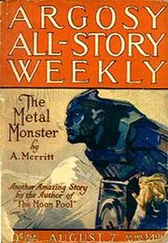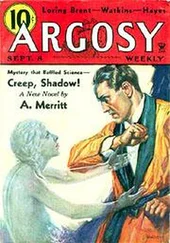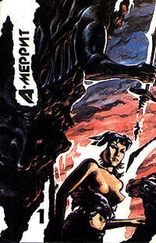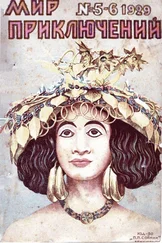Of references to a great city which had sunk beneath the sea, I found many. In some it was named Ys, in others nameless. The accounts which placed its destruction within Christian times were clearly apocryphal. The city, whatever it was, belonged to prehistoric times. In almost all the references accent was put upon its wickedness; its prostitution to evil spirits; to sorcery. Largely, the legend clung closely to the resumй I had given the night before. But there was one variant which interested me mightily. This said it was a Lord of Carnac who had brought about the fall of Ys. That he had "beguiled Dahut the White, Daughter of the King, even as she had beguiled many men to their destruction." It went on to say that "so great was the beauty of this sorceress that not for long could the Lord of Carnac summon resolution to destroy her and evil Ys; and she had borne a child, a daughter; and when he had opened the sea gates he had fled with this child, while the shadows of Ys thrust him on to safety even as they thrust on the waves to overwhelm Dahut and her father who pursued him."
That, in the light of de Keradel's theory of ancestral memories, rather startled me. For one thing, it gave me a clearer angle upon the Demoiselle's remarks about my "remembering." And it gave another explanation, though seemingly a preposterous one, why I had spoken those two names. If this Dahut came straight down from that Dahut, maybe I came straight down from the Lord of Carnac who had so "beguiled" her. In that event, contact might have started one of the de Keradel disks in my brain to action. I thought that the Alkar-Az and the Gatherer must have made a very strong impression upon the ancient Lord of Carnac, my ancestor, to cause the particular disk which registered them to be the first to become articulate. I grinned at the idea, and thought of Helen. Whatever the other memories, I remembered I had a date with Helen that night, and I was damned glad. I had a date with Dahut, too, but what of it?
I looked at my watch. It was five o'clock. I pulled out my handkerchief and something fell tinkling to the floor. It was the bracelet, and it lay with the black talisman staring up at me like an eye. I stared back at it with that uncanny feeling of recognition of its symbol growing stronger and stronger.
I went to the Club to dress. I had ascertained where the de Keradels were stopping. I sent Helen a telegram:
Sorry. Unexpectedly called out of town. No time to telephone. Call you up tomorrow. Love and kisses.
Alan.
At eight I was sending my card in to the Demoiselle.
It was one of those towering apartment houses overlooking the East River; sybaritic; their eastward and most desirable windows looking down upon Blackwell's Island where the outcasts, the lesser fry of criminals, those not worthy of Sing Sing's social life, Dannemora's austerity, or the honor of occupancy in similar fortresses of civilization, are penned; a catch basin for the dregs.
The apartment houses were the Zenith complacently contemplating the Nadir.
The elevator went up and up. When it stopped, its operator signaled, and after a second or two a massive door in the shaft slid aside. I stepped out into a hall that was like the ante-room of a medieval chamber. I heard the door whisper its closing, and turned. Tapestries which had been held aside by the women were dropping into place, hiding it. I took swift note of the tapestry's design, solely through force of habit – an adventurer's habit of studying landmarks along the path in event of forced retreat. It portrayed the sea-woman, the fay Melusine, being surprised by Raymond of Poitiers, her husband, during her weekly bath of purification. It was very ancient.
The men were Bretons, swarthy, stocky, but clothed as I had never seen men in Brittany. They wore loose tunics of green, tight-belted and on their right breasts, in black, the red symbol of the bracelet's pebble. Their leg coverings were fawn-color, baggy, tapering below the knee and tied tightly at the ankle; like those of the Scythians and the old Celts. Their feet were sandaled. As they took my coat and hat I gave them pleasant greeting in the Breton – a noble's customary greeting to a peasant. They responded humbly, and in kind, and I saw a furtive, puzzled glance pass between them.
They drew aside another tapestry, one pressing his hand against the wall as he did so. A door slid open. I passed through into a surprisingly large, high-ceilinged room paneled with ancient dark oak. It was dimly lit, but I glimpsed carven chests here and there, an astrolabe, and a great table strewn with leathern and vellum-covered books. I turned just in time to see the door slip back in place, leaving the paneling apparently unbroken. Nevertheless, I thought I could find it again in case of need.
The two men led me across the room, toward its right hand corner. Again they drew a tapestry aside, and a mellow golden glow bathed me. They bowed, and I passed into the glow.
I stood in an octagonal room not more than twenty feet across. Its eight sides were covered with silken hangings of exquisite texture. They were sea- green and woven in each was an undersea picture – fishes strangely shaped and colored swimming through a forest of feathery kelp… anemones waving deadly tentacles over mouths that were like fantastic flowers… a gold and silver school of winged snakes guarding their castles of royal coral. In the center of the room a table was set with antique crystal, translucent porcelain and archaic silver gleaming under the light of tall candles.
I thrust my hand into the hanging by which I had entered, drew it aside. There was no sign of a door… I heard laughter, like the laughter of little ruthless waves, the laughter of Dahut…
She was at the far side of the octagonal chamber, holding one of the hangings half aside. There was another room there, for light streamed through and formed a faint rosy aureole around her head. And the beauty of her made me for a dozen heart-beats forget everything else in the world – even forget that there was a world. From white shoulders to white feet she was draped in a web-like gown of filmy green in flowing folds like the stola of the women of ancient Rome. Her feet were sandaled. Two thick braids of her pale gold hair dropped between her breasts, and through her drapings every lovely line and contour were plain. She wore no jewels – nor needed any. Her eyes both caressed and menaced me – and there was both tenderness and menace in her laughter.
She came toward me and put her hands on my shoulders. Her fragrance was like that of some strange flower of the sea, and touch and fragrance rocked me.
She said, and in the Breton tongue:
"So, Alain – you still are cautious. But tonight you go only when it is my will that you go. You taught me my lesson well, Alain de Carnac."
I asked, stupidly, still under that numbing spell of her beauty:
"When did I teach you anything, Demoiselle?"
She answered:
"Long… and long… and long ago." And now I thought that the menace nigh banished the tenderness in her eyes. The straight brows drew together in unbroken line. She said, absently:
"I had thought that it would be easy to say that which I have to say when I met you tonight, Alain. I thought the words would pour from me… as the waters poured over Ys. But I am confused… I find it difficult… the memories struggle against each other… hate and love battle…"
By now I had gotten myself a little in hand. I said: "I, too, am confused, Demoiselle. I do not speak the Breton as you and that, perhaps, is why I am dull to your meaning. Could we not speak French or English?"
The truth was that the Breton was a little too intimate; brought me too close to her mind. The other languages would be a barrier. And then I thought: a barrier against what?
Читать дальше

![Абрахам Меррит - Лунный бассейн [Лунная заводь]](/books/20623/abraham-merrit-lunnyj-bassejn-lunnaya-zavod-thumb.webp)










